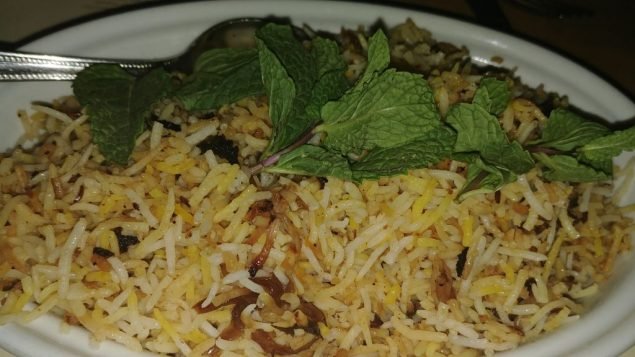Food Paves a Parsi-Jewish Passage to India
Locals gathered for a night of cultural experiences during Challah Walla Vol. 2.
Food’s power to educate people about cultures united Parsi chef Meherwan Irani (owner of Chai Pani), Jewish chefs Todd Ginsberg (The General Muir) and Eli Kirshtein (formerly The Luminary), and Indian chef Archna Becker (Bhojanic) for Challah Walla, an evening of delicious food and discussion about cultural similarities between Jews and Parsis on Dec. 7 at The General Muir.
The restaurant was packed, but I found a corner table with three other women, Rim Hendi from Egypt, Leah Efstathion from Greece and Kennedy Hawkins from Alabama, who were all as excited as I was to learn about similarities between Parsis and Jews.
When I first heard about the event, I was excited to try some Indian food, but I never imagined I would gain a deeper appreciation for my culture or new friends.
Before dinner, Irani talked about Parsis and Jews. He noted that Zoroastrians and Jews lived side by side thousands of years ago in Persia — modern Iran — until religious persecution forced them to flee to countries such as India.
Parsis are today known as India’s Jews. Although they’ve diverged from their ancestors, traditional dishes have helped preserve their heritage.
As the waiter brought our appetizers, we were awe-struck by the assortment of foods before us, such as burekas filled with squash and dates, as well as onion, garlic and poha samosas. I took one bite of the bureka and was instantly transported to my childhood.
I grew up eating Persian desserts with ingredients such as rose water, saffron and crushed walnuts, which the burekas reminded me of, and learned from Hendi that those ingredients were also popular in Egyptian cuisine.
The ladies and I were still finishing our appetizers when the waiter brought the first course: saffron and spinach matzah ball soup and chraime of bream gefilte fish. As a Sephardic Jew, I didn’t grow up eating traditional Ashkenazi dishes but have grown to enjoy them since my dad began incorporating them into our family Shabbat dinners.
Still, you can imagine my surprise when Efstathion asked the only Jew at the table, “What’s gefilte fish, and how is it made?”
I was not much help, but Hendi began to explain what gefilte fish is and how it is often found in big jars in supermarkets. I am pretty sure Hendi didn’t grow up eating Jewish food, and I found it fascinating that she knew so much about Jewish culture.

Before we dug in, Hendi and I noticed that something was missing. Where was the yogurt that is customary to serve alongside Middle Eastern dishes?
The waiter said the yogurt was cooked into the rice. Hendi and I looked at each other in disbelief. Iranians and Egyptians for the most part serve yogurt on the side.
But we were happy to discover a modern adaptation of the menu and learn something.

Hendi and I knew this was a question we could both answer. The Middle East has different climates and regions that help produce an array of spices, such as turmeric and saffron, not readily available for everyday cuisine in other countries.
As we finished the last morsels of our desserts, I couldn’t help recalling American Jewish Committee Atlanta Regional Director Dov Wilker’s earlier comments: “I hope that your experience through food will not only translate into your stomachs, but also your hearts and minds, and will create an opportunity for you to share your story not just with people at your table, but with friends throughout the community.”
How lucky I am that I was able to do both.





